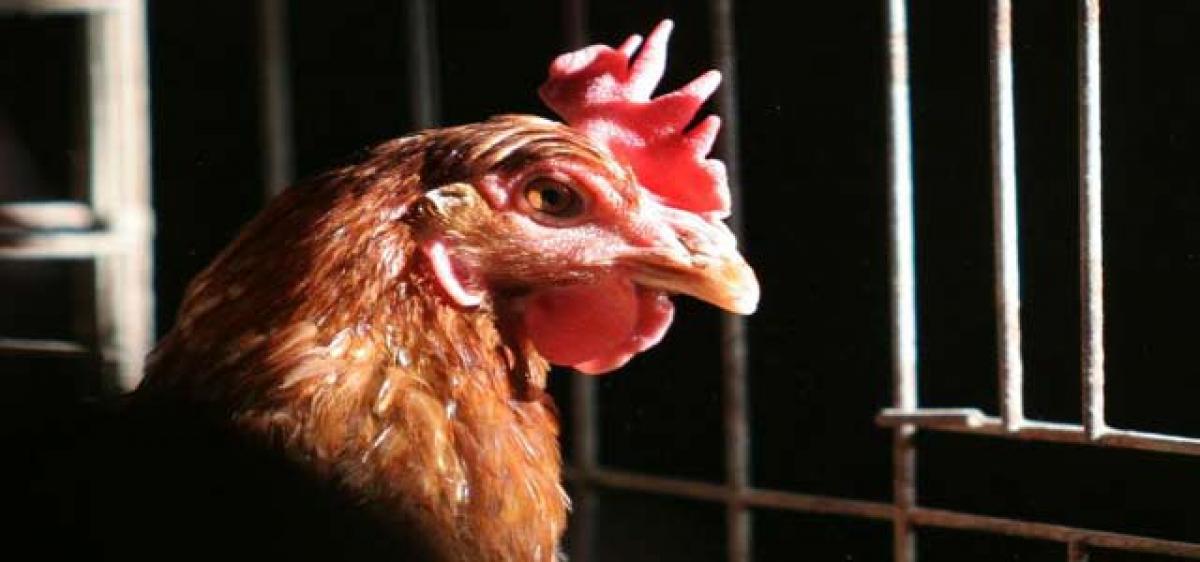Live
- World Bank team lauds edn dept for transformative efforts
- SIPB approves Rs 85,000 cr investments
- AP Assembly session: Eighth day meeting begins with question hour
- Facial recognition attendance system in TG Secretariat soon
- Nearly 6,000 contract employees whose services were regularised get relief in HC
- VIT celebrates 40th anniversary
- Bandi Sanjay reviews ‘Sampoorna Abhiyan’ in Nagaland
- A brain dead person saves four as his organs donated
- SRR students excel in various competitions
- ISRO's communication satellite launched by Musk's SpaceX
Just In

Surreptitious drug-evading bacteria with heightened virulence and ability to infect humans have turned up in chickens in India, scientists said, indicating an “alarming” consequence of the nation’s fast-growing poultry industry and the misuse of antibiotics.
Hyderabad: Surreptitious drug-evading bacteria with heightened virulence and ability to infect humans have turned up in chickens in India, scientists said, indicating an “alarming” consequence of the nation’s fast-growing poultry industry and the misuse of antibiotics.
As much as 11 per cent of chickens sampled in the markets of Hyderabad carried multidrug-resistant bacteria commonly found in birds and known to sicken people, a study found.
The research is published recently in Applied and Environmental Microbiology, a journal of the American Society for Microbiology.
The supergerms were detected in both intensively farmed broilers and free-range fowl, and were capable of thwarting routine antibiotics, scientists from the University of Hyderabad and the Robert Koch Institute in Berlin said.
The finding suggests contaminated meat may be spreading superbugs through the food chain and the environment, potentially causing hard-to-treat infections in people.
Farms supplying poultry-meat companies routinely use antibiotics classified by the World Health Organization as “critically important” as a way of staving off disease.
“Our findings provide scientific support to what is known about the use of antibiotics in the food-animal sector amid a lack of a properly enacted antibiotics policy in this country,” Niyaz Ahmed, a senior author of the paper, told Bloomberg.
The H pullorum bacteria found in the chickens was remarkable because, besides harbouring various genes for drug resistance, strains were also armed with the ability to produce toxins that potentially can damage the DNA of human cells, the researchers found.
Their research was based on a study of the gastrointestinal tracts of 55 broiler and 45 free-range chickens bought at seven produce markets in Hyderabad.
More than 100 virulence genes were identified in the bacterial samples, including 40 related to motility, which could enhance the pathogen’s ability to take hold inside the intestinal tracts of both chickens and people, and 20 that enhanced the microbe’s ability to persist, including in warmer-bodied poultry, the authors said.
Some genes also better equipped the bacteria to evade the immune system’s defences. In humans, H pullorum is thought to cause gastroenteritis and may be associated with cancer and cirrhosis of the liver.
The fact that free-range chickens, which aren’t routinely administered antibiotics, carried the superbugs was “truly unexpected,” Niyaz Ahmed said.
It could indicate that these fowl occasionally eat antibiotic-containing feed, or are exposed to the bugs via contaminated water and food, or of the faeces of infected animals and people, he said.
But it means the gene-altered bacteria from the intensive poultry industry have spread to “even the stocks that were so far considered as a safe choice,” he said.
H pullorum could become a public health concern because of the cancer-causing potential, and because “in countries like India, H pullorum from poultry could be multi-resistant already because of the prevailing animal husbandry practices.
Changed agricultural systems in recent years are likely to heighten the occurrence and spread of infectious diseases, leading to increased antibiotic usage and resistance.
Indians consume 14 times more chicken meat than they did in 1985, and the market is one of the fastest-growing in the world.
A study last year predicted the use of antibiotics in livestock could more than quadruple by 2030 in some parts of India, primarily driven by “extreme” growth in chicken consumption.
The bulk of antibiotics are used to spur animal growth. Stopping that practice in India would result in an annual loss of meat production worth about $1.1 billion, an Organisation for Economic Co-operation and Development report last year found.
India doesn’t have regulatory provisions for the use of antimicrobial drugs in cattle, chickens and pigs raised for domestic consumption.

© 2024 Hyderabad Media House Limited/The Hans India. All rights reserved. Powered by hocalwire.com







